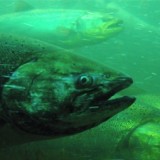Return to the scene of BC’s biggest environmental protest – more vulnerable today
than ever. Wild salmon populations in Clayoquot Sound are collapsing, and the Wild
Fish Conservancy is searching for answers, beginning with the open net salmon farms
that clog the fjords of this ecological treasure. The Common Sense Canadian catches
up with the scientific team in Clayoquot to discover what they’ve learned after two
years of important research.


I believe that we have to let local, regional and federal government know that we want independant studies done rather than government so we can have acurate unbias analysis.
Wonderful research being done by Wild Fish Conservancy. I especially like the sea lice research control inlets with no fish farms compared to the inlets with fish farms. Not rocket science, just plain common sense. Good stuff!
A great debt of thanks is owed by us all to this dedicated team of researchers who are doing an outstanding job here. Let us all PLEASE forward this link to our Political leaders to ensure that they have the required evidence to erradicate the open pen fish farms from our coastline. There is a viable option in closed containment systems so we ALL need to push the DFO to ensure that we do not lost our wild salmon forever.
Glyn Lewis
Maple Ridge
(Sport fisherman)
Excellent documentary!
I hope it’ll contribute to rising awareness…
excellent video … rational thinkers can draw a logical conclusion from the evidence (more fish farms = more lice on smolts and no fish farms = few lice)
so what to do about fish farms?
well done Damien
Brian